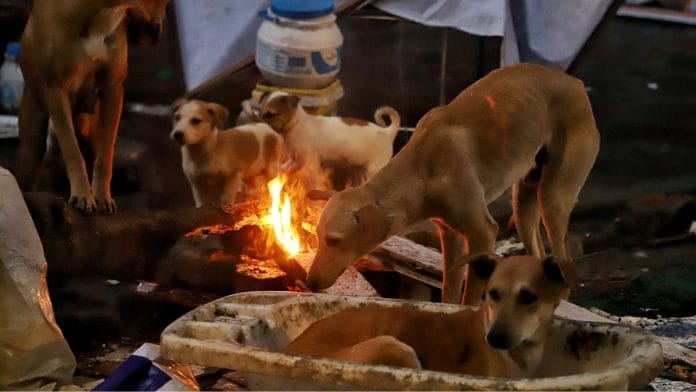Gurugram: In a significant ruling reinforcing strict animal welfare laws, the Punjab and Haryana High Court has dismissed a petition by the Resident Welfare Association (RWA) of Taksila Heights, Gurugram, which had challenged an official order requiring the return of stray dogs—described by residents as aggressive—to the society after their vaccination and sterilisation.
Justice Kuldeep Tiwari, in his final order, meticulously dissected the Animal Birth Control (ABC) Rules, 2023, affirming the local authorities’ power and responsibility in stray dog management.
The legal tussle began after the RWA of Taksila Heights, Sector 37-C, Gurugram, moved the HC against a communication dated 19 May, 2025, issued by the Sub-Divisional Officer (Civil), Badshahpur, Gurugram, in his capacity as Chairman of a Deputy Commissioner-constituted committee, directed the Chief Medical Officer, Municipal Corporation, Gurugram, to return the dogs to Taksila Heights. The dogs had been removed from the society following a child bite incident.
Also read: Indian laws are letting animals down every day. It’s a legal, moral, ethical issue
The trigger
The genesis of this judicial intervention lies in a distressing incident on September 22, 2024, when an eight-year-old child from Taksila Heights sustained severe injuries from a dog bite, necessitating treatment at a hospital. Approximately a month later, the child’s mother filed a police complaint.
In the aftermath, and at the insistence of residents, an NGO, Umeed for Animals Foundation, captured six stray dogs from the society.
However, the removal of these dogs swiftly led to a counter-complaint on 24 September, 2024, by another resident Garima Tripathi.
She alleged that the child’s parents and other residents had resorted to beating the dogs and unlawfully removing them, in violation of the Animal Birth Control Rules, 2023. Tripathi’s complaint also included serious allegations of CCTV camera manipulation and threats against those attempting to record the incident.
This counter-complaint resulted in an FIR dated 9 November, 2024, registered under Section 325 of the Bharatiya Nyaya Sanhita (BNS) which pertains to mischief by killing or maiming an animal, and Section 11(1)(1) of the Prevention of Cruelty of Animals Act, 1960.
Subsequently, the Gurugram Deputy Commissioner formed a three-member committee on 26 March, 2025, to investigate the matter, culminating in the contested order for the dogs’ return.
RWA’s contentions: Jurisdiction and canine aggression
Ishaan Bhardwaj, counsel for the petitioner RWA, mounted a multi-pronged challenge to the official directive.
He argued that the order was issued without proper jurisdiction, contending that Sub-section (2) of Rule 20 of the Animal Birth Control Rules, mandates a seven-member committee, including an RWA representative, for such decisions.
Furthermore, Bhardwaj invoked Rule 11 of the Haryana Municipal (Registration and Proper Control of Dogs) Bye-laws, 2005, asserting that while it permits seizure and sterilisation, it does not implicitly authorise the return of dogs, especially those deemed aggressive.
The RWA’s core argument rested on the premise that the ABC Rules, 2023, should not apply to “aggressive” dogs. The counsel also highlighted the absence of a proper assessment of the dogs’ health (e.g. rabies, extreme aggression) and the lack of consultation with residents prior to the decision.
A strict reading of the law
Justice Kuldeep Tiwari, in his judgment, meticulously dissected the legal framework governing stray animal management. He underscored the paramountcy of the Animal Birth Control Rules, 2023, which became effective on 10 March, 2023.
The Court referenced Rule 8(2), which unequivocally places the onus of deworming, immunisation, and sterilisation of street animals on the local authority, allowing collaboration with recognised Animal Welfare Organisations. Rule 10 reinforces the local authorities’ duty to maintain proper Animal Birth Control Centres.
Justice Tiwari’s ruling hinged on Rule 11, which outlines the procedure for capturing, sterilising, immunising, and releasing street dogs. The court specifically highlighted Sub-clause (8) and (19) of Rule 11, which explicitly mandate that all captured dogs, identified with numbered collars, must be released in “the same area from where it was captured, after sterilisation and immunisation”.
Addressing the RWA’s contention regarding aggressive dogs, the court referred to Rule 16(6). This provision dictates that if a dog is found not to have rabies but suffers from another disease or is “furious in nature”, it should be handed over to an Animal Welfare Organisation for necessary treatment and subsequent release after a 10-day observation period. The rules do not provide for permanent relocation away from their original territory merely due to aggression, unless specific conditions like rabies are met.
The HC critically observed that the initial capture of the dogs by the Umeed for Animals Foundation was executed in “complete ignorance of the provisions of Rules of 2023”. It clarified that an NGO can only capture dogs as a legitimate representative of local authorities and strictly in compliance with the prescribed rules—a procedural lapse that led to the registration of the FIR.
Justice Tiwari also dismissed the RWA’s argument concerning Rule 20(2) of the 2023 Rules, clarifying that this provision relates to the designation of feeding spaces and was not germane to the central conflict of the petition.
The High Court’s definitive order signals a firm judicial stance on the implementation of the Animal Birth Control Rules. It reinforces the mandatory nature of returning sterilised and immunised stray dogs to their original habitats, even in the face of resident concerns regarding aggression, provided the dogs do not pose a direct rabies threat or suffer from other specific diseases.
(Edited by Zinnia Ray Chaudhuri)






